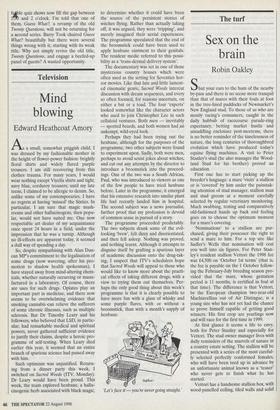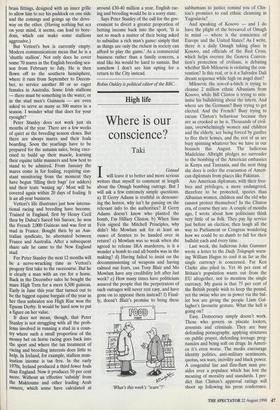The turf
Sex on the brain
Robin Oakley
First one has to start picking up the breeder's language: a mare 'visits' a stallion or is 'covered' by him under the painstak- ing attention of stud manager, stallion man and stud groom at a moment carefully selected by regular veterinary monitoring. Much swabbing, testing and comparatively old-fashioned hands up back end feeling goes on to choose the optimum moment for a mare's covering.
`Nominations' to a stallion are pur- chased, giving their possessor the right to send a mare to him. For a top sire like Sadler's Wells that nomination will cost you well into six figures. For Peter Stan- ley's resident stallion Vettori the 1998 fee was £4,500 on 'October 1st terms' (that is, the fee is payable on the 1 October follow- ing the February-July breeding season pro- vided that the mare, whose gestation period is 11 months, is certified in foal at that time). The difference is that Vettori, by the European champion two-year-old Machiavellian out of Air Distingue, is a young sire who has not yet had the chance to prove himself capable of getting good winners. His first crop are yearlings now and will race for the first time in 1999.
At first glance it seems a life to envy, both for Peter Stanley and especially for Vettori. The stud owner manager lives with daily reminders of the marvels of nature in a country estate setting. The stallion will be presented with a series of the most careful- ly selected perfectly conformed females, who will have been teed up in advance by an unfortunate animal known as a 'teaser' who never gets to finish what he has started.
Vettori has a handsome stallion box, with wood-panelled ceiling, tiled walls and solid brass fittings, designed with an inner grille to allow him to see his paddock on one side and the comings and goings up the drive- way on the other. (Having nothing but sex on your mind, it seems, can lead to bore- dom, which can make some stallions aggressive.) But Vettori's box is currently empty. Modem communications mean that he is a `shuttle stallion'. Not only does he cover some 70 mares in the English breeding sea- son from February to July. He is then flown off to the southern hemisphere, where it runs from September to Decem- ber, to service another 80 or so eager females in Australia. Some Irish stallions — there must be something in the water, or in the stud men's Guinness — are even asked to serve as many as 300 mares in a season. I wonder what that does for your eyesight?
Peter Stanley does not work just six months of the year. There are a few weeks of quiet as the breeding season closes. But there are always mares and their foals boarding. Soon the yearlings have to be prepared for the autumn sales, being exer- cised to build up their muscle, learning their equine table manners and how best to stand to be admired. From January the mares come in for foaling, requiring con- stant monitoring from the moment they have begun 'filling their bags' (or udders) and their teats 'waxing up'. Most will be covered again within 20 days of foaling. It is an all-year business.
Vettori's life illustrates just how interna- tional racing and breeding have become. Trained in England, first by Henry Cecil then by Dubai's Saeed bin Suroor, he won the French 2,000 Guineas and was first at stud in France. Bought then by an Aus- tralian syndicate, he alternated between France and Australia. After a subsequent share sale he came to the New England stud.
For Peter Stanley the next 12 months will be a nerve-wracking time as Vettori's progeny first take to the racecourse. But he is clearly a man with an eye for a horse. Back in the December sales he bought the mare High Tern for a mere 6,500 guineas. Early in June this year that turned out to be the biggest equine bargain of the year as her then unbeaten son High Rise won the Epsom Derby. It would be hard now to put a figure on her value.
It does not mean, though, that Peter Stanley is not struggling with all the prob- lems involved in running a stud in a coun- try where such a small proportion of the money bet on horse racing goes back into the sport and where the tax treatment of racing and breeding interests does little to help. In Ireland, for example, stallion nom- ination income is tax free. In the early 1970s, Ireland produced a third fewer foals than England. Now it produces 50 per cent more. Without an effective 'subsidy' from the Maktoums and other leading Arab owners, which some have calculated at around f..30-40 million a year, English rac- ing and breeding would be in a sorry state.
Says Peter Stanley of the call for the gov- ernment to divert a greater proportion of betting income back into the sport, 'It is not so much a matter of their being asked to subsidise a rich man's game: simply that as things are only the richest in society can afford to play the game.' As a commercial business rather than a family concern, a stud like his would be hard to sustain. But somehow I don't see him opting for a return to the City instead.
Robin Oakley is political editor of the BBC.

























































 Previous page
Previous page